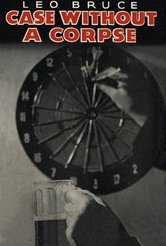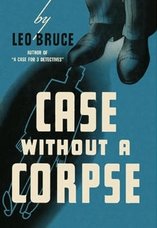 1937 U.K. Cover
1937 U.K. Cover The previous year’s Case for Three Detectives is a minor classic of the satiric mystery genre, pitting the unassuming (and, by contrast, coarse) Beef against three caricatures of Brilliant Literary Sleuths, only to show them all up by the end. Case without a Corpse treads some of the same ground, but with somewhat diminishing returns.
There are some candidates, however. Rogers was seen by a witness with a young woman named Stella Smythe on the back of his motorcycle. Rogers had purchased a curious length of clothesline rope prior to the ride, and now the woman cannot be traced. A questionable acquaintance, Fairfax, has also disappeared, and a strange foreigner, perhaps “half-Indian”, had been spotted in the area, seemingly trailing Rogers on that fateful day. A search of the moors only turns up a scrap of burnt paper in the dead man’s handwriting, and the small-town sergeant reluctantly looks to the metropolitan police and the efficient figure of Scotland Yard’s Detective-Inspector Stute for help.
Leo Bruce – the pen name of Rupert Croft-Cooke – clearly enjoys exploring the comical possibilities of mystery fiction, almost equally in plot, character, and prose. Case without a Corpse has its healthy quota of lively, folksy villagers, even with Sergeant Beef excepted. Take this conversation between Stute and Mrs. Walker, the too-talkative owner of Rose Cottage where Stella Smythe had been staying:
“In the meantime, you had heard nothing of what had passed between them?”
“Certainly not. I never listen to other people’s conversation, besides the wall between the tea-room and the kitchen is too thick to hear anything and whenever I went into the room they shut up like deckchairs and waited till I’d shut the door before they went on with what they were saying.”
“Thank you so much,” I said, “for letting me come round with you to-day.”
“Oh, that’s all right,” [Stute] returned with something approaching a smile. “We’re used to that, you know. A crime wouldn’t be a crime nowadays without half a dozen of you literary people hanging about after it. Why only the other day… But perhaps I’d better not tell you about her. She’d put me in her new book. Good night.”
Even with these strengths of tone and character, also present are weaknesses in plotting that might frustrate a constant reader of classic mysteries. GAD scholar Nicholas Fuller notes that Corpse has “one of those plots which hinge on the victim’s stupidity,” and indeed this is a point that feels particularly unsatisfying, sorely straining (if not entirely breaking) one’s suspension of disbelief.
 1937 U.S. Cover
1937 U.S. Cover Still, Leo Bruce’s comic touches make this a breezy read, and a curious one at that, with the failed detective pleasantly likeable and the successful sleuth not as well done as his name might imply.
 RSS Feed
RSS Feed